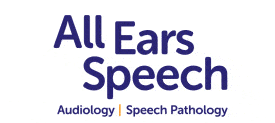Implantable Hearing
Technology

Program overview
Implantable Hearing Technology is considered a solution for hearing loss when conventional hearing aids are no longer able to provide access to sounds for good speech understanding. Implantable hearing technology refers to hearing devices that require surgery, e.g., a Cochlear Implant or Bone Anchored Hearing Device.
The team at All Ears & Speech understand that each client presents with their unique hearing history, audiological presentation and listening needs. To ensure all suggested hearing solutions meet your listening goals and expectations, you will be assessed and managed by 2 experienced implant audiologists. This ensures your continuity of care.
Recommendations made are based on results obtained during your pre-operative appointments, and in consultation with one of All Ears & Speech’s associated Ear, Nose and Throat Surgeons. Implantable hearing technology is recommended when the latest research and best practices suggest that there is a significantly greater likelihood of improved hearing and understanding using an implantable hearing device than a conventional hearing aid.
The pre-operative process is a time for you to ask lots of questions, gain a better understanding of your hearing loss and all solutions available to meet your hearing needs and communication goals. There is no commitment for you to proceed and ultimately the decision is yours.
Pre-operative programs are tailored specifically for your clinical presentation. It is suggested that you bring a family member or close friend to your appointments for support and to facilitate discussion following.
- A comprehensive assessment to carefully define your hearing profile; your type and degree of hearing loss, along with your speech understanding and communication abilities.
- Liaison with your hearing aid provider to ensure your conventional hearing device is optimised (where applicable).
- Trial of a device (using a headband where a bone anchored hearing device is recommended).
- An opportunity to meet other hearing implant recipients.
- Liaison with your ENT Surgeon, General Practitioner and others involved in your ongoing care.
For some clients several implantable technology solutions may be suitable, particularly for those with single sided deafness. We believe our pre-operative program ensures all hearing options are explored thoroughly and that you receive optimal pre- and post-operative care. Written information will be provided throughout the program. When a cochlear implant is recommended, pre-operative assessment includes consultation with our clinical psychologist. This is to ensure your expectations are realistic and that you have supports in place following surgery for the rehabilitation program required. Our cochlear implant recipients have found this most beneficial.
Choosing the right device for your needs
For some clients several implantable technology solutions may be suitable, particularly for those with single sided deafness. We believe our pre-operative program ensures all hearing options are explored thoroughly and that you receive optimal pre- and post-operative care. Written information will be provided throughout the program.
When a cochlear implant is recommended, pre-operative assessment includes consultation with our clinical psychologist. This is to ensure your expectations are realistic and that you have supports in place following surgery for the rehabilitation program required. Our cochlear implant recipients have found this most beneficial.

Maintaining your best possible hearing has positive outcomes on your health and wellbeing. The team at All Ears & Speech is committed to providing solutions to keep you connected with your loved ones and engaged in all the things you enjoy.
We work collaboratively with ENT Surgeons Dr. Sharad Chawla and Dr. Ian Wong to offer implantable hearing technology for those clients where conventional hearing aids no longer provide benefit. Your ENT surgeon will carefully consider suggested hearing solutions alongside your cause and degree of hearing loss, ear anatomy and medical fitness to proceed. Additional medical investigations may be required, such as CT, MRI and balance testing. Should your surgeon recommend an implantable hearing device, and you choose to proceed, detailed information will be provided on any risks and what to expect before, during and after surgery. Implantable hearing device surgery is generally a routine operation and accepted well. Your surgeon will be part of your ongoing care following.
Dr Sharad Chawla is an Ear Nose and Throat Surgeon based in Adelaide. He is a Fellow of the Royal Australasian College of Surgeons (RACS) and a member of Australian Society of Otolaryngology and Head and Neck Surgery (ASOHNS).
He is Fellowship trained in otology and skull base surgery. He is a visiting specialist at Flinders Medical Centre, The Queen Elizabeth Hospital and Lyell McEwin Hospital.
Special interests:
- Surgery for chronic ear infection
- Hearing rehabilitation surgery including cochlear implant
- Lateral skull base surgery
- General ENT – Paediatric and adult
Consulting rooms:
ENT Surgeons
Memorial Hospital Enter Via Pennington Tce., North Adelaide SA 5006
Phone: (08) 8267 5200
Dr Ian Wong is a senior visiting ENT specialist at the Adelaide Women’s and Children’s Hospital and Modbury Public Hospital.
He has held these appointments since completing his training in 2008 and his practice encompasses both adult and paediatric ENT conditions. He also holds regular operating sessions at Parkwynd Hospital, Glenelg Community Hospital and Burnside Hospital. He serves as a member of the Medical Advisory Committee for Glenelg Community Hospital and has been treasurer for the South Australian Branch of the Australian Society of Otolaryngology and Head & Neck Surgery since 2010.
He has a special interest in minimally invasive surgery of the ear as well as implantable hearing technologies. He was one of the earliest adopters of endoscopic ear surgery and has accumulated extensive experience in this technique. He was also responsible for introducing into Australia the world’s first transcutaneous bone conduction hearing device.
Ian is passionate about sharing his expertise with those in need, particularly in regional areas. He has monthly visits to both Mt Gambier as well as the Riverland districts.
Special interests:
- Minimally invasive surgery of the ear
- Implantable hearing technologies, endoscopic ear surgery
- Otolaryngology Head & Neck Surgery
Consulting rooms:
- Burnside Village: Suite J, 447 Portrush Rd, Glenside SA 5065 Phone: (08) 8336 7001
Criteria for implantable hearing technology (cochlear implant or bone conduction implant) is constantly evolving. The following is provided as a general guide as to whether an implantable hearing solution may best meet your client’s hearing needs and communication goals. For some clients, more than one solution may be available.
The initial appointment is to:
- Determine whether your client’s audiological presentation is likely to meet the criteria for implantable hearing technology and
- For your client to gather information on implantable hearing solutions.
Should implantable hearing technology be a suitable option, expert medical opinion and management will be required from an Ear, Nose and Throat Surgeon associated with our team. GP referral to an ENT Specialist will be required at this time.
Your client may be a good candidate for a cochlear implantation if with conventional hearing aid(s) they continue to;
- Require information to be repeated in quiet
- Mishear and respond incorrectly to questions asked
- Have ongoing difficulties communicating and keeping up at work
- Feel exhausted due to the extra effort they require to listen and attend
- Avoid social activities (becoming increasingly more withdrawn)
- Rely on visual information (i.e. lip reading)
Age is not a precluding factor, however your client needs sound cognitive abilities to be able to learn to use the sound delivered by a cochlear implant.
Your client must also be medically suitable to undergo a general anaesthetic.
Bone anchored hearing solutions are generally recommended for:
- Conductive Hearing Loss (i.e. middle ear pathology that cannot be surgically repaired and where a conventional hearing aid is not an option). Baha is considered as the hearing solution of choice when there is on average a conductive component of 30dB.
- Single-sided deafness (i.e. a profound sensorineural hearing loss in one ear where conventional hearing aids provide little or no benefit). This hearing solution will enable sound to be detected from both sides however it does not restore binaural hearing (i.e. listening with both ears).
Lifelong Hearing & Support
At All Ears & Speech we are committed to lifelong hearing and support. Your hearing needs and goals may change across your lifespan, and we are here for you every step of the way. This includes:
- Routine programming of your device using the latest techniques to ensure optimal outcomes
- Regular assessments to highlight your progress and identify areas requiring further support
- Liaison with others involved in your care (e.g., you may have a conventional hearing aid in your other ear managed by another provider, external speech pathologist, medical specialists etc.)
- Equipment troubleshooting and maintenance support (batteries, replacements, spare parts, magnets)
- Loan device/s should your equipment require maintenance or repair
- Equipment upgrades as new technology emerges
- Advocate for you with the National Disability Insurance Scheme (NDIS), Hearing Australia, Department of Veteran’s Affairs and Private Health Providers.
- Support letters for accidental loss or damage under your home and contents insurance policy
We're All Ears.
Contact us if you have a question or would like to speak to one of our friendly clinical support team.
You’re the reason we love what we do!




